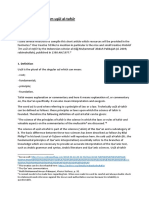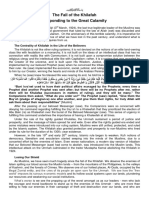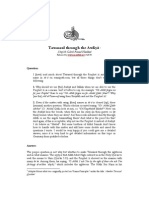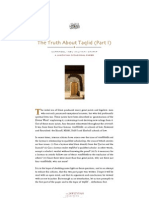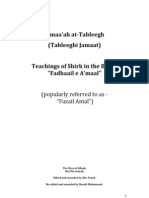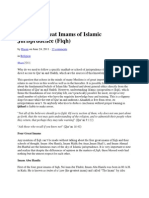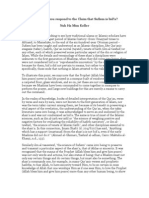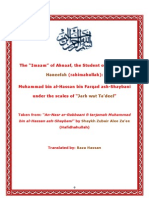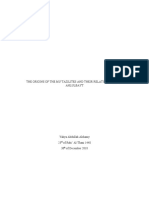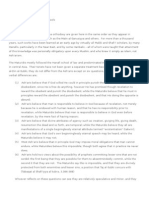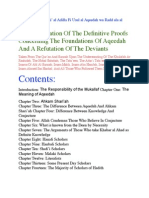0 ratings0% found this document useful (0 votes)
74 viewsUsul Fiqh
Usul Fiqh
Uploaded by
Ewan PeaceThe document introduces Usul al-Fiqh (principles of Islamic jurisprudence). It defines Fiqh as the science of understanding legal obligations derived from Islamic sources like the Quran, Sunnah, scholarly consensus (ijma), and analogy (qiyas). Scholars divide Fiqh into Usul al-Fiqh, which explains how rules are deduced from sources, and Furu, the practical rules of law. Usul al-Fiqh aims to protect religion, life, intellect, lineage and property.
Copyright:
© All Rights Reserved
Available Formats
Download as PPTX, PDF, TXT or read online from Scribd
Usul Fiqh
Usul Fiqh
Uploaded by
Ewan Peace0 ratings0% found this document useful (0 votes)
74 views6 pagesThe document introduces Usul al-Fiqh (principles of Islamic jurisprudence). It defines Fiqh as the science of understanding legal obligations derived from Islamic sources like the Quran, Sunnah, scholarly consensus (ijma), and analogy (qiyas). Scholars divide Fiqh into Usul al-Fiqh, which explains how rules are deduced from sources, and Furu, the practical rules of law. Usul al-Fiqh aims to protect religion, life, intellect, lineage and property.
Original Description:
Introduction of Usul Fiqh
Copyright
© © All Rights Reserved
Available Formats
PPTX, PDF, TXT or read online from Scribd
Share this document
Did you find this document useful?
Is this content inappropriate?
The document introduces Usul al-Fiqh (principles of Islamic jurisprudence). It defines Fiqh as the science of understanding legal obligations derived from Islamic sources like the Quran, Sunnah, scholarly consensus (ijma), and analogy (qiyas). Scholars divide Fiqh into Usul al-Fiqh, which explains how rules are deduced from sources, and Furu, the practical rules of law. Usul al-Fiqh aims to protect religion, life, intellect, lineage and property.
Copyright:
© All Rights Reserved
Available Formats
Download as PPTX, PDF, TXT or read online from Scribd
Download as pptx, pdf, or txt
0 ratings0% found this document useful (0 votes)
74 views6 pagesUsul Fiqh
Usul Fiqh
Uploaded by
Ewan PeaceThe document introduces Usul al-Fiqh (principles of Islamic jurisprudence). It defines Fiqh as the science of understanding legal obligations derived from Islamic sources like the Quran, Sunnah, scholarly consensus (ijma), and analogy (qiyas). Scholars divide Fiqh into Usul al-Fiqh, which explains how rules are deduced from sources, and Furu, the practical rules of law. Usul al-Fiqh aims to protect religion, life, intellect, lineage and property.
Copyright:
© All Rights Reserved
Available Formats
Download as PPTX, PDF, TXT or read online from Scribd
Download as pptx, pdf, or txt
You are on page 1of 6
Chapter 1
Introduction of Usul Fiqh
Fiqh is derived from the root word of fa qa ha which
literally means comprehension or true understanding
And make loose the knot (the defect) from my tounge,
That they understand my speech
(Taha: 27-28)
GE 20503 (Usul Fiqh) - Nurul Izzati Abd Razak 2
Fiqh Definition
The knowledge of what is for mans self and what is
against mans self (Imam Abu Hanifah)
Science of the rules of law (Al-Ghazali)
Science of the understanding the legal obligations
derived from its sources (i.e. Quran, sunnah and the
other sources of Islami Law (Al-Amidi)
GE 20503 (Usul Fiqh) - Nurul Izzati Abd Razak 3
Fiqh Definition
Fiqh or the science of Islamic Law is the knowledge of
ones rights and obligations derived from Quran or
sunnah of the Prophet, or the consensus of opinions
among the learned (ijma), or analogical reasoning
GE 20503 (Usul Fiqh) - Nurul Izzati Abd Razak 4
Scholars of Islamic Law devide the science of fiqh into two main
divisions:
The usul, which means the roots or foundations
The furu, the branches of law
Usul Fiqh explain the indications and methods by which the rules
of fiqh are decuded from their sources. This indications are
found mainly in the Quran and sunnah which are the principal
sources of Islamic Law
GE 20503 (Usul Fiqh) - Nurul Izzati Abd Razak 5
Usul Fiqh
Protection of al-din
Protection of life (al-nafs)
Protection of dignity or lineage (al-ird)
Protection of intellect (al-aql)
Protection of property (al-mal)
GE 20503 (Usul Fiqh) - Nurul Izzati Abd Razak 6
Objectives of Shariah
You might also like
- Biography of Abu Baker Al Razi & HisLife and WorkDocument50 pagesBiography of Abu Baker Al Razi & HisLife and Workmooshi68100% (4)
- Lubaab'l Al Madkhal PDFDocument75 pagesLubaab'l Al Madkhal PDFMAliyu2005No ratings yet
- The 10 Mabādī of Ilm U Ūl Al-TafsirDocument4 pagesThe 10 Mabādī of Ilm U Ūl Al-TafsirHarun MafhūmNo ratings yet
- The Fall of KhilafahDocument2 pagesThe Fall of KhilafahRiski Amalia100% (1)
- Endless BlissDocument3,248 pagesEndless BlissAhmadGhanemNo ratings yet
- Al-'Usul (Islamic Legal Maxims) Imam KarkhiDocument68 pagesAl-'Usul (Islamic Legal Maxims) Imam KarkhiNounik DarsyahNo ratings yet
- Aqidah Al-Tahawiyya: Al-Athar, Are Encyclopaedic in Scope and Have Long Been Regarded As Indispensable ForDocument12 pagesAqidah Al-Tahawiyya: Al-Athar, Are Encyclopaedic in Scope and Have Long Been Regarded As Indispensable FormrpaharyNo ratings yet
- Political Participation: Refuting The Claims of Extremist SeparatistsDocument54 pagesPolitical Participation: Refuting The Claims of Extremist SeparatistsAnonymous odpEIdBpPNo ratings yet
- Talfiq Mixing MadhabsDocument4 pagesTalfiq Mixing MadhabsradiarasheedNo ratings yet
- Nuh Ha Mim Keller - Is Allah Literally in The SkyDocument8 pagesNuh Ha Mim Keller - Is Allah Literally in The SkyMTYKKNo ratings yet
- MustalahDocument11 pagesMustalahAbdulahi FarahNo ratings yet
- On The Antromorphism of SalafisDocument5 pagesOn The Antromorphism of SalafisPhLogIsTonNo ratings yet
- The Obligation of TaqlîdDocument64 pagesThe Obligation of TaqlîdYounus Ali100% (1)
- Tawassulawliya GfhaddadDocument3 pagesTawassulawliya GfhaddadShadab ChangeziNo ratings yet
- The Truth About TaqlidDocument13 pagesThe Truth About TaqlidhayataliNo ratings yet
- TAQLEEDDocument12 pagesTAQLEEDAlbani Studenti StudentiNo ratings yet
- Replies To Some of Ihsan Ilahi Zahir's Attacks On Imam Ahmad Rida Khan Al-BarelwiDocument23 pagesReplies To Some of Ihsan Ilahi Zahir's Attacks On Imam Ahmad Rida Khan Al-BarelwiAbdul Mustafa100% (9)
- Ibn Taymiyyas Fatwa On AbortionDocument22 pagesIbn Taymiyyas Fatwa On Abortionadeelq2409No ratings yet
- Jamaa'ah At-Tableegh (Tableeghi Jamaat) : (Popularly Referred To As - "Fazail Amal")Document40 pagesJamaa'ah At-Tableegh (Tableeghi Jamaat) : (Popularly Referred To As - "Fazail Amal")TCFNo ratings yet
- Book No. 5 Physical Presence of Our Prophet After Death (FINAL)Document51 pagesBook No. 5 Physical Presence of Our Prophet After Death (FINAL)Kabeer AhmedNo ratings yet
- Abul Hasan On Mujahid's Athar On MakanDocument23 pagesAbul Hasan On Mujahid's Athar On MakanIrsan DesrisaNo ratings yet
- Refuting InnovationDocument4 pagesRefuting Innovationchr0nikNo ratings yet
- Glimpses of Shia Islam in Masnad Ibn e Hambal (Sunni Book)Document18 pagesGlimpses of Shia Islam in Masnad Ibn e Hambal (Sunni Book)Shia Books For DownloadNo ratings yet
- Al Aqwal Al RajihaDocument265 pagesAl Aqwal Al RajihaАбу ЯхьяNo ratings yet
- Verifying The Hadeeth: "There Is No 'Itikaaf Except in The Three Mosques"Shaikh Muhammad Bin 'Abdil-Wahhaab Al-WassaabeeDocument14 pagesVerifying The Hadeeth: "There Is No 'Itikaaf Except in The Three Mosques"Shaikh Muhammad Bin 'Abdil-Wahhaab Al-WassaabeeMountainofknowledgeNo ratings yet
- DAISDocument20 pagesDAISSaima SyedNo ratings yet
- Lessons in Usool and FiqhDocument41 pagesLessons in Usool and FiqhHassan AhmedNo ratings yet
- Bernard Weiss - The Theory of Tawatur According To GhazaliDocument26 pagesBernard Weiss - The Theory of Tawatur According To GhazaliGiovanniM.Carrera100% (1)
- Critical Response To Yamin ZakariaDocument58 pagesCritical Response To Yamin ZakariaJason Galvan (Abu Noah Ibrahim Ibn Mikaal)100% (2)
- The Four Great Imams of Islamic JurisprudenceDocument5 pagesThe Four Great Imams of Islamic JurisprudenceArslan Khalid100% (1)
- Can Weak or Daeef Ahadeeth Be Used As Proof in IslamDocument13 pagesCan Weak or Daeef Ahadeeth Be Used As Proof in IslamRafiq AhmedNo ratings yet
- Imam Al-Shatibi PDFDocument6 pagesImam Al-Shatibi PDFFarooq_Ashraf_1No ratings yet
- Nuh Ha Mim Keller - Response To The Claim That Sufism Is BidaDocument3 pagesNuh Ha Mim Keller - Response To The Claim That Sufism Is BidaMTYKK100% (1)
- Hizb Ut-TahreerDocument2 pagesHizb Ut-TahreerIbn SadiqNo ratings yet
- Great Scholars of Islam and Mawlid An-Nabawi SharifDocument14 pagesGreat Scholars of Islam and Mawlid An-Nabawi Sharifahmedmars2003No ratings yet
- ShaybaniDocument17 pagesShaybanitoobasoftNo ratings yet
- Kalam Theology OriginsDocument30 pagesKalam Theology OriginssohaibNo ratings yet
- An Investigation of The Nasafi Creed andDocument9 pagesAn Investigation of The Nasafi Creed andAbe Li HamzahNo ratings yet
- The Origins of The Mutazilites and Their Relationship With Ahlulbayt (VC)Document11 pagesThe Origins of The Mutazilites and Their Relationship With Ahlulbayt (VC)Qadiri DervishNo ratings yet
- Method To Appoint A KhaleefahDocument37 pagesMethod To Appoint A KhaleefahshujaurrahmanNo ratings yet
- We Have Not Sent You Asa: "Mercy To The Worlds" (Surah Al-Anbiya, 21:107)Document15 pagesWe Have Not Sent You Asa: "Mercy To The Worlds" (Surah Al-Anbiya, 21:107)mianshahNo ratings yet
- The Direction Debate Razi Vs Ibn TaymiyyDocument24 pagesThe Direction Debate Razi Vs Ibn Taymiyysaid bouzidiNo ratings yet
- Maturidi Ahsari 6 Points of Difference - As-SubkiDocument2 pagesMaturidi Ahsari 6 Points of Difference - As-Subkidonkonkee100% (2)
- Making Masah On Regular Socks by SHEIKH MUFTI TAQI USMANIDocument7 pagesMaking Masah On Regular Socks by SHEIKH MUFTI TAQI USMANIMUSALMAN BHAINo ratings yet
- Ibn Kathir On MawlidDocument2 pagesIbn Kathir On MawlidmrpaharyNo ratings yet
- The Attributes of Allāh: Imam Taqīyyudīn Al-SubkīDocument2 pagesThe Attributes of Allāh: Imam Taqīyyudīn Al-SubkīAli Asghar ShahNo ratings yet
- This Content Downloaded From 141.161.91.14 On Tue, 25 Aug 2020 15:49:45 UTCDocument26 pagesThis Content Downloaded From 141.161.91.14 On Tue, 25 Aug 2020 15:49:45 UTCPhil AndrewsNo ratings yet
- 06 Ibn Taymiyya andDocument42 pages06 Ibn Taymiyya andShep Smith100% (1)
- Ad Dalaail by Shehu Uthman Dan FuduyeDocument13 pagesAd Dalaail by Shehu Uthman Dan FuduyeDawudIsrael1100% (1)
- The Letter of Imām Abū Hanīfah To Imām Uthmān Al Battī 2Document14 pagesThe Letter of Imām Abū Hanīfah To Imām Uthmān Al Battī 2John DoeNo ratings yet
- The Clarification of The Definitive Proofs Concerning The Foundations of Aqeedah and A Refutation of The DeviantsDocument74 pagesThe Clarification of The Definitive Proofs Concerning The Foundations of Aqeedah and A Refutation of The DeviantsNourieNourNo ratings yet
- Women Scholars of HadithDocument8 pagesWomen Scholars of HadithShadab ShaikhNo ratings yet
- Are The Salafis Ahlul Bid'ah or Ahlus SunnahDocument14 pagesAre The Salafis Ahlul Bid'ah or Ahlus SunnahMuhammadAbdulNo ratings yet
- The Sources of Fiqh: A General Survey (Ahmad Hasan)Document22 pagesThe Sources of Fiqh: A General Survey (Ahmad Hasan)shees1993No ratings yet
- Avicenna's Theory of Science: Logic, Metaphysics, EpistemologyFrom EverandAvicenna's Theory of Science: Logic, Metaphysics, EpistemologyNo ratings yet
- Exposing the Khawarij Infiltration of the Blessed Muhammadan NationFrom EverandExposing the Khawarij Infiltration of the Blessed Muhammadan NationNo ratings yet
- Preaching Islamic Renewal: Religious Authority and Media in Contemporary EgyptFrom EverandPreaching Islamic Renewal: Religious Authority and Media in Contemporary EgyptNo ratings yet


